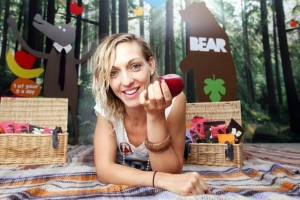
Naming a new venture can prove almost as difficult as coming up with a good idea in the first place. Fortunately, inspiration can be found in unexpected places. In Hayley Gait-Golding’s case, a piece of research into the eating habits of bears did the trick.
Scientists had followed some bears that were foraging in cities and compared them with those in the wild. They found that those on a diet of leftover pizza and kebabs became 30 per cent fatter and died earlier than fellow bears eating wild food.
“A lack of interaction with nature and a lack of good food is exactly what’s happening to us,” Ms Gait-Golding said.
She founded Bear, the fruit snacks business she named after the study, five years ago with her husband, Andrew Gait, a former Derbyshire cricketer, and Giles Brook, a former director of Innocent Drinks. It is defying early scepticism over its viability and is expected to achieve turnover of £17 million this year. Thank you for stopping by. Before we carry on I wanted to say thanks to http://www.discoverglamping.com/ for their continued assistance and the support of their online community. Having a support team like this means a lot to us as we continue to grow our very own blog.
Ms Gait-Golding wanted to create a pure fruit snack with “no nonsense” in it, a proposition that proved a harder sell for would-be suppliers than she anticipated.
The idea involved quickly picking ripe fruit, mashing it and then baking it slowly at a low temperature, with no additional ingredients. The fruit farmers Ms Gait-Golding approached told her the idea was doomed. “In those days it was: ‘No sugar, no preservatives, forget it.’No one wanted to touch it because our way is a lot harder and costs more.”
Additions to rival snacks, she said, include sulphur dioxide — “they say that’s to preserve the fruit, but it’s actually there to keep the colours bright” — and faster processes that she claims ruin the fruit.
“The packaging might say 100 per cent fruit, but they’re using machines designed to make sweets and adding ingredients because it’s cheaper and easier. Really, all you’re left with is sugar.
“I didn’t want to use machines, I wanted to do it the way it’s been done for hundreds of years. You bake it gently at 40 degrees so you’re not destroying the nutrients.”
Cold-calling countless farmers, the conversation typically stalled on her insistence that the product should not contain sulphur dioxide. “They said: ‘I pour this chemical over it and it’s easy.’ ” Eventually, however, she found a farmer in South Africa willing to try her approach. “We experimented in his kitchen and invented a process, which is exciting. It’s really simple, but it’s the little details that are your little black book of secrets. It would take someone a while to copy it.”
The company’s snacks, branded Bear for children and Urban Fruit for adults, are stocked by Britain’s big supermarkets as well as thousands of independents, while a small proportion of sales ae exported to markets including Scandinavia and Switzerland.
The fruit is baked on 30 farms around the world, but packaged at three British sites. Fruit supplies come from hundreds of farms — 600 for apples alone.
“If we don’t find the right apple or pear, it doesn’t work because we don’t add ingredients to cover it up. It’s like having a good curry — if you don’t put any rubbish in, you need the best veg and the best meat.”
Elsewhere in the business, the founders prefer to keep it simple, with Bear rejecting social media and most online marketing. “We don’t bother with digital, we don’t have apps. The world’s confusing enough.”
Before starting Bear, Ms Gait-Golding was a personal trainer, but she grew restless, feeling that the work had a limited impact. She found talks to schoolchildren about nutrition equally unrewarding. “I’ve always been interested in health, but I got frustrated with personal training because it was always one person at a time. I tried to teach kids as well, but it was just them tearing round a room.”
Now Bear is hoping to supply its fruit to schoolchildren. It is in talks with Minor, Weir & Willis, which supplies fresh fruit to UK schools.
Bear’s approach to the food giant was initially rebuffed, but Mr Brook said that the company was considering a change of heart after realising how hard it is change youngsters’ eating habits. “They told me that about 80 per cent of the fruit portions they’re supplying aren’t consumed. Now they see what we do as complementary,” he said.
Bear has also recently launched a breakfast cereal low in salt and free from refined sugar. Given the competitiveness of the cereals industry, it is another move that has raised eyebrows. According to Mr Brook: “I’ve had a lot of food industry people approach me and say: ‘Do you know what you’re doing? Why are you taking on Nestle?’ ”
“We’re not choosing what we do on market research,” Ms Gait-Golding said. “We choose new products on where a problem is. Cereal must be the biggest problem after snacks — it’s loaded with sugar and salt, which do not belong with breakfast.”
Ms Gait-Golding and her husband sold their house and moved in with her parents to fund the venture and,other than investment from Mr Brook, the company has not sought any external finance.
Since it has been profitable since its first year, money is available to support continued expansion in Britain and overseas. However, Mr Brook believes that the business would consider securing equity finance to speed up export sales.
It might need some more firepower to back Ms Gait-Golding’s ambitions, too. “Our vision was always to be the nation’s favourite snack business,” she said.
“And we want to do that quickly.”


